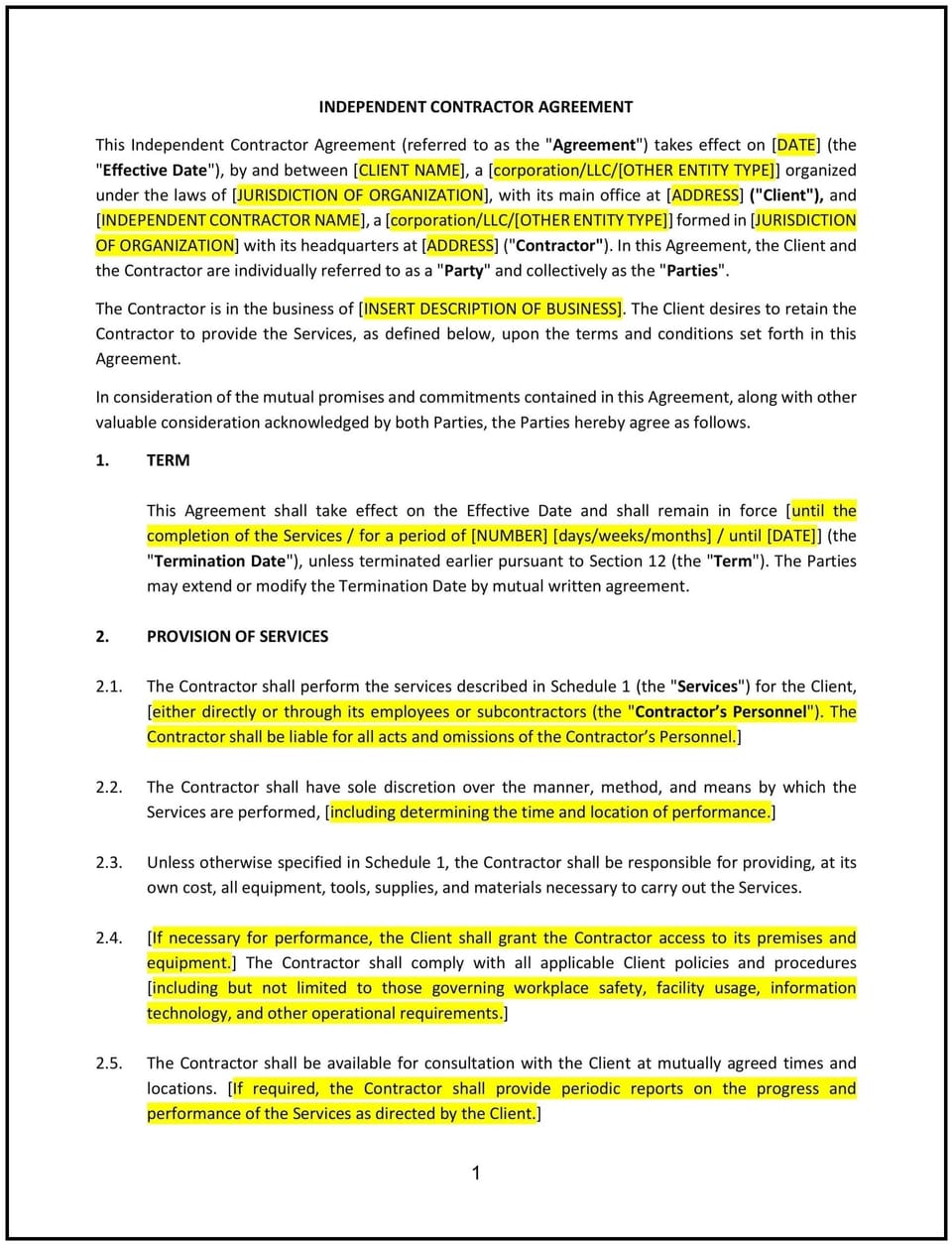Independent Contractor Agreement (Delaware): Free template

Independent Contractor Agreement (Delaware)
An Independent Contractor Agreement in Delaware is a legally binding contract that defines the relationship between a business and an independent contractor. Unlike employees, independent contractors operate as self-employed professionals responsible for their own taxes, insurance, and business expenses. This agreement helps businesses establish clear expectations while supporting compliance with Delaware’s worker classification laws.
Delaware follows IRS guidelines and the Delaware Department of Labor (DOL) regulations to determine whether a worker qualifies as an independent contractor. The state generally uses the common-law test, evaluating factors such as the degree of control over work, financial independence, and whether the worker operates as a separate business entity. Misclassification can lead to penalties, back taxes, and legal disputes, making a properly drafted contract essential.
Industries in Delaware such as technology, consulting, construction, and healthcare frequently use independent contractors for specialized work. This agreement protects both parties by outlining key terms and legal considerations.
Tips for drafting and maintaining an Independent Contractor Agreement in Delaware
- Clearly define the scope of work, including specific deliverables, deadlines, and expectations to avoid disputes.
- Outline payment terms, including invoicing requirements, payment schedules, and late payment policies. Delaware law allows independent contractors to negotiate flexible payment arrangements.
- Include a contractor status clause affirming that the worker is an independent contractor and does not qualify as an employee under Delaware labor laws.
- Protect confidential business information by incorporating non-disclosure clauses. Delaware law recognizes enforceable NDAs as long as they are reasonable in scope and duration.
- Clarify intellectual property ownership, particularly in cases where the contractor is developing proprietary content or technology. Work-for-hire clauses should be explicitly stated if the hiring entity intends to own the contractor’s work.
- Establish dispute resolution procedures, specifying whether conflicts will be resolved through Delaware courts, arbitration, or mediation. Many businesses choose arbitration for efficiency.
Frequently asked questions (FAQs)
Q: What should Delaware businesses include in an Independent Contractor Agreement?
A: The contract should outline work scope, payment terms, liability protections, confidentiality obligations, and the contractor’s classification status.
Q: How does an Independent Contractor Agreement benefit businesses in Delaware?
A: It helps businesses document the contractor relationship, avoid misclassification risks, and establish enforceable work expectations.
Q: Can a Delaware business control how an independent contractor works?
A: No, businesses can set deadlines and work expectations, but independent contractors must maintain control over how they perform their work to qualify as independent under state and federal law.
Q: How does Delaware determine if a worker is an independent contractor?
A: Delaware follows IRS guidelines and the common-law test, assessing factors such as the level of control over the worker and whether the worker operates an independent business.
Q: Are non-compete clauses enforceable in Delaware independent contractor agreements?
A: Delaware generally enforces reasonable non-compete clauses, but restrictions must be limited in scope, duration, and geographic reach to be valid.
Q: How can businesses avoid misclassifying independent contractors in Delaware?
A: Businesses should ensure that contractors retain work independence, do not receive employee benefits, and have control over their own work schedules.
Q: What happens if an independent contractor claims they were misclassified as an employee in Delaware?
A: The Delaware Department of Labor or IRS may investigate, potentially leading to penalties, back taxes, and liability for unpaid benefits.
Q: Are verbal Independent Contractor Agreements enforceable in Delaware?
A: While verbal agreements may be legally binding in some situations, a written contract is strongly recommended to document the relationship and prevent disputes.
This article contains general legal information and does not contain legal advice. Cobrief is not a law firm or a substitute for an attorney or law firm. The law is complex and changes often. For legal advice, please ask a lawyer.


